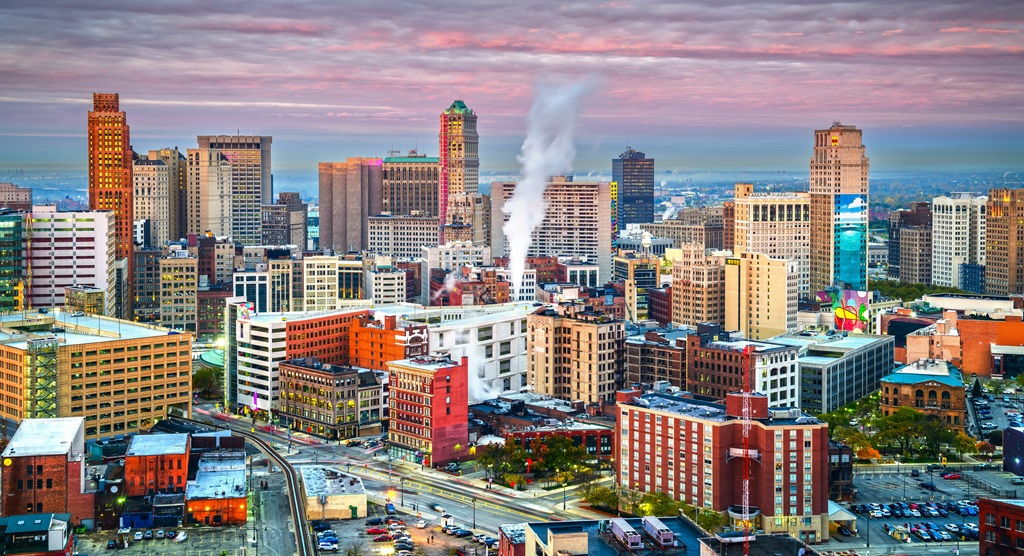In May, I attended Welcoming America’s Welcoming Interactive conference in Detroit, where over 900 leaders gathered to explore what it takes to build communities where everyone feels they belong. Set in a city shaped by industrial booms, disinvestment, and powerful local activism, the conference was an opportunity to share insights and reflect on how truly welcoming communities don’t just warmly greet newcomers, they work to transform the systems that have long excluded them.
Detroit’s Legacy of Renewal and Community Power
Welcoming Interactive spotlights effective practices and inspiring stories of immigrant inclusion, and hosting it in Detroit was especially meaningful given how the city has been shaped by both the promise of opportunity and the pain of systemic disinvestment. Once a beacon of economic promise, particularly for Black families migrating north during the Great Migration and for immigrants seeking stable work, the same automotive industry that brought jobs also helped lay the groundwork for inequity and injustice. The disinvestment from auto companies devastated working-class neighborhoods and compounded a long-standing history of racial violence – such as redlining and segregation – that had already defined the city’s geography and infrastructure.
Against this backdrop, Welcoming Interactive emphasized how cultivating communities where everyone feels welcomed and included requires addressing the unmet needs of all of its members. When housing is unaffordable, wages are low, and public systems fail – communities become vulnerable to what researchers call zero-sum thinking: the belief that if someone else gains, one must lose. Detroiters have overwhelmingly rejected this false scarcity narrative and are instead investing in the work of repair.
Organizations like the Detroit Hispanic Development Corporation are on the frontlines, preventing violence through community-led interventions and investments. Welcoming Interactive attendees met with founder Angie Reyes, and visited La Joya Gardens, a $25 million mixed-use development housing project that opened in early 2025 in Southwest Detroit, home to a predominantly Latino neighborhood often referred to as MexicanTown. The project transformed a long-vacant block into a community anchor addressing the growing problem of unaffordable housing and exemplifies how community-rooted developments can address systemic inequities that lay the groundwork for more welcoming spaces.
Sharing a Blueprint for Bridge Building
While Detroit’s history underscores the harm caused by failing systems, each session at Welcoming Interactive revealed how leaders are reimagining systems rooted in collective care and shared belonging. In the absence of a clear roadmap, the people most committed to repair are forging new paths to bridge divides. To support our collective learning, the Center for Inclusion and Belonging at the American Immigration Council shared findings from an impact evaluation of 22 organizations engaged in bringing people together across lines of difference, through the Belonging Innovational Lab (BIL) Fellowship and the Inclusion Innovation Collaborative (IIC).
Our session, Rooted in Trust: The Power of Local Leadership to Transform Communities, shared key takeaways from both the BIL and the IIC. We highlighted the strategic use of storytelling to invite empathy and understanding, ways to institutionalize bridge building practices within organizational infrastructures, the importance of flexibility and adaptation based on a community’s particular needs, and the long-term investments – both financial and relational – required to sustain this work overtime.
Global Detroit, a Belonging Innovation Lab Fellow, played a central role at this year’s Welcoming Interactive. Their project focused on connecting newly arrived migrants with long-standing African American communities, an initiative they detail in the report, Contact Theory as a Tool for Cultivating Social Cohesion, offering a case study for relational bridge building and community repair.
Reimagining Belonging as a Shared Responsibility
Whether it was through the stories shared at each session, the insights exchanged through new connections, or the examples witnessed across Detroit, Welcoming Interactive made clear that communities across the country are building belonging in real time. Not perfectly, and not without struggle, but with intention and vision.
My time in Detroit and first-time attendance at Welcoming Interactive reminded me that when communities organize to meet their needs, it’s possible for immigrants to be received not with fear and resentment, but with solidarity. The question no longer asks, “Do we have enough resources for more people,” and instead explores, “What would it look like if all of us had what we needed to thrive and feel like we belong?” And perhaps more importantly, “What role must we each play in building belonging?”
FILED UNDER: Michigan, Welcoming Initiatives


